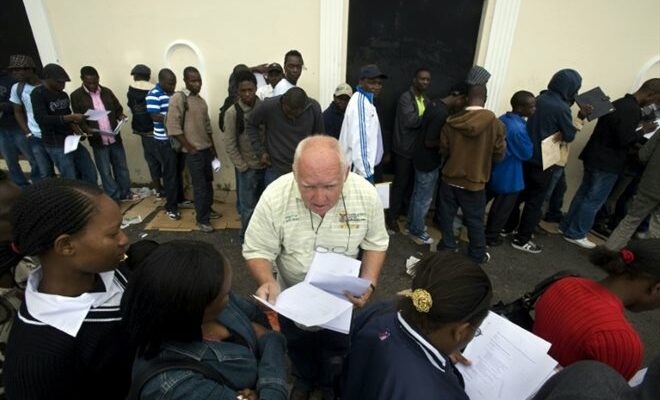South African immigration officers check work visas in Springs, September 22, 2022 (AFP/Archives/MARCO LONGARI)
Foreign executives, engineers, tens of thousands of them have sometimes been waiting for more than a year for their work visa for South Africa, with a slow-moving administration forcing certain companies to abandon their projects in the continent’s leading industrial power. .
The government recognizes that the country, plagued by endemic unemployment and a serious electricity crisis, is experiencing a shortage of qualified workers. And if the problem of long administrative delays exists in other countries, South Africa badly needs manpower and skills to revive a sluggish economy, according to experts.
“We have several cases of people who have been waiting for more than a year,” underlines Pamina Bohrer, at the Italian-South African Chamber of Commerce.
“The backlog is staggering,” fumes Busisiwe Mavuso, director of Business Leadership South Africa, which brings together dozens of international companies, including BP, Nestlé and Unilever.
“The fact that companies cannot fill positions means they cannot invest and grow,” he continued in a note published last month.
Some have come to suspend or even abandon their projects in the country.

An anti-immigrant demonstration in Pretoria, November 24, 2021 (AFP/Archives/Phill Magakoe)
The Minister of the Interior, Aaron Motsoaledi, explained in September before a parliamentary committee that due to a severe lack of administrative staff, 74,000 visa applications were awaiting processing. Contacted by AFP, the ministry did not respond to a request for comment.
Unsurprisingly, the phenomenon has worsened since the coronavirus pandemic: in 2021, only 3,047 visas issued on the basis of sought-after skills, such as mastery of a foreign language, were issued, a drop of 45% per year. compared to 2019, according to official figures.
About two thirds of applications were rejected. Lung x-rays, criminal records from all the countries where you have resided or even bank account statements over several months, the list of documents to be provided is as long as your arm.
– Inconsistencies –
International companies also complain about the inconsistency of the process. Some requests are processed in a few weeks, others drag on for months. In some cases, applicants obtain a permit but not their spouse or children.
Files are refused for reasons considered frivolous, such as the absence of a telephone number on a document. Obtaining a work visa can take 48 weeks or more. Four times more than in Nigeria or Kenya.
In an investigation by the European Union Chamber of Commerce in South Africa last year, an anonymous entrepreneur claimed that the visa quagmire pushed him to choose Ghana instead to set up his offices on the continent.
“My company would like to continue its expansion in South Africa (…) but the uncertainty regarding visas has put a brake on this expansion,” he wrote.
According to a government report last year, each arrival of a new qualified employee generates jobs in the country. A 1% increase in this immigration could increase GDP by 1.2%, while the country’s central bank’s growth forecast is only 0.8% this year.

A South African Interior Ministry employee distributes forms to Zimbabweans seeking work visas, December 31, 2010 in Cape Town (AFP/Archives/RODGER BOSCH)
The report recommends reforms including specific visas for remote workers and start-ups and a trusted employer system to make hiring easier.
The adopted changes are expected to be made public soon. But as the 2024 elections approach, there could be hesitation, observers say: many South Africans blame immigrants, particularly from regional countries, for unemployment and rising crime. constant increase.
According to Jakkie Cilliers of the Institute for Security Studies (ISS) in Pretoria, the government’s security approach to immigration is undermining efforts to attract investment.
“We have a Department of Home Affairs and a Department of Labor that are actively trying to prevent foreigners from coming to South Africa,” he said.
© 2023 AFP
Did you like this article ? Share it with your friends using the buttons below.




